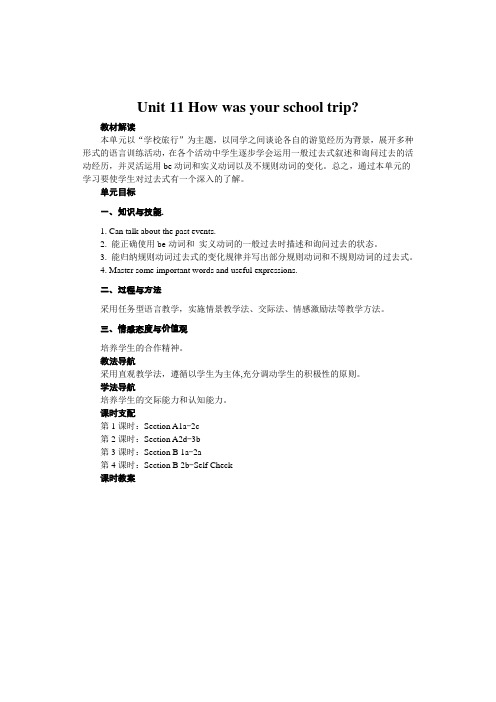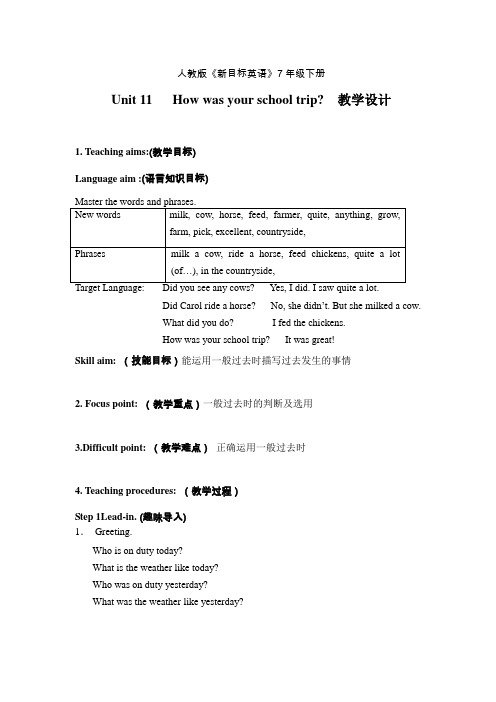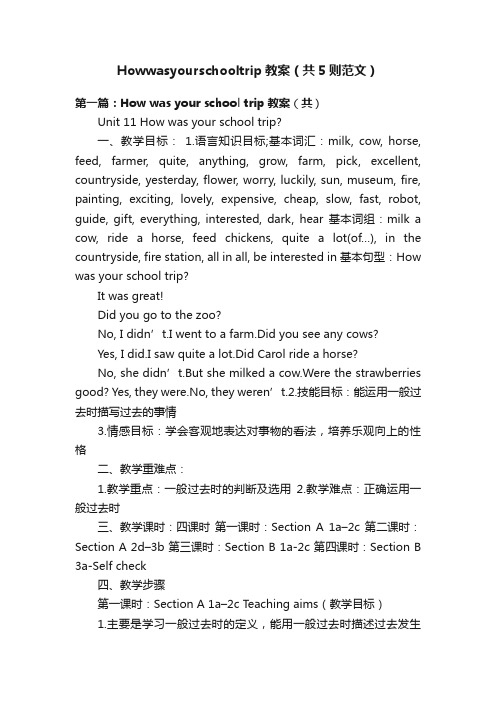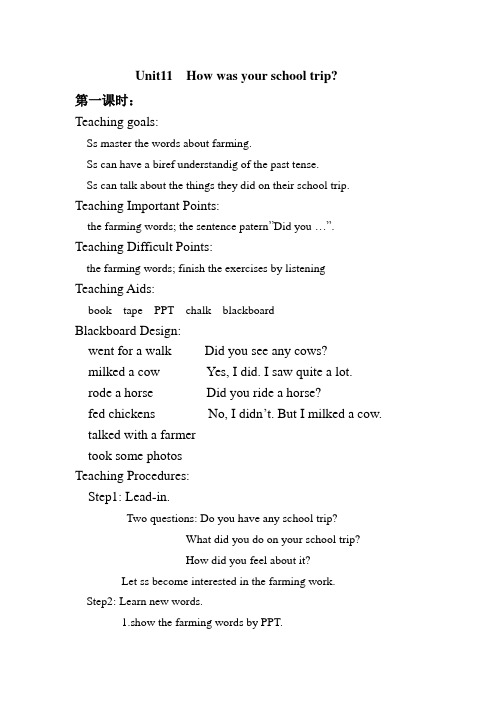Unit11--How-was-your-school-trip-教学设计 (1)
unit-11-How-was-your-school-trip教案

Unit 11 How was your school trip?教材解读本单元以“学校旅行”为主题,以同学之间谈论各自的游览经历为背景,展开多种形式的语言训练活动,在各个活动中学生逐步学会运用一般过去式叙述和询问过去的活动经历,并灵活运用be动词和实义动词以及不规则动词的变化。
总之,通过本单元的学习要使学生对过去式有一个深入的了解。
单元目标一、知识与技能.1. Can talk about the past events.2. 能正确使用be动词和实义动词的一般过去时描述和询问过去的状态。
3. 能归纳规则动词过去式的变化规律并写出部分规则动词和不规则动词的过去式。
4. Master some important words and useful expressions.二、过程与方法采用任务型语言教学,实施情景教学法、交际法、情感激励法等教学方法。
三、情感态度与价值观培养学生的合作精神。
教法导航采用直观教学法,遵循以学生为主体,充分调动学生的积极性的原则。
学法导航培养学生的交际能力和认知能力。
课时支配第1课时:Section A1a-2c第2课时:Section A2d-3b第3课时:Section B 1a-2a第4课时:Section B 2b-Self Check课时教案教案A第1课时1a-2c教学目标一、知识与技能1. 学会用动词的过去式描述过去发生的事。
2. Improve the listening and speaking skill.3. 掌握一些规则变化动词的过去式和一些不规则变化的动词。
二、过程与方法采用目标和任务教学法,调动学生的积极性,引导他们积极参与课堂。
三、情感态度与价值观提高认知能力。
教学重点1. 学会用动词的过去式描述过去发生的事。
2. Improve the listening and speaking skill.3. 掌握一些规则变化动词的过去式和一些不规则变化的动词教学难点学会用动词的过去式描述过去发生的事。
Unit-11-How-was-your-school-trip教学设计

Unit 11 How was your school trip?Section B 2a-2cTeaching objectivesAbility objectivesStudents are able to find out the topic sentence and then predict the main idea of the diaries.Students are able to get the detailed information by comparing different opinions.Students are able to talk about past events using the simple past tense. Emotional objectivesStudents are willing to share their own experiences using the simple past tense.Cross-cultural awarenessStudents are able to know about different school trips both at home and abroad.Learning StrategiesStudents are able to grasp the reading strategies: the topic sentence, skimming and scanning.Students are able to know that different people may have different opinions towards one thing.Key Points and Difficult PointsKey points:Students are able to use the descriptive words and understand the diaries by some reading strategies.Difficult points:Students are able to make a conversation according to the diaries and use the past tense correctly.Teaching MethodsTask-based teaching methodSituational teaching methodTeaching proceduresStep1 Warming-upTask: Students use as many descriptive words as possible to describe their trip.Intention: to lead in the topic and to stimulate students’ in terest; to present the new words.Step2 Pre-readingTask 1: Students classify the descriptive words in 2a.Intention: to personalize the target language and prepare Ss for the subsequent reading activity.Task 2 Prediction: Ss look at the pictures and read the instruction of 2b, then predict what the passage is about.Intention:to learn to predict by pictures and prepare for reading.Step3 While-readingTask 1: Ss check their predictions by reading the first and last sentences. Intention: to learn to get the main idea by finding the topic sentence. Task 2 Skimming: Ss read the diary entries quickly and answers the questions.Intention: to learn to skim while reading a passageTask 3 Scanning: Ss read the diary entries again carefully and complete the chart in 2c.Intention:to learn to scan the useful information while reading the passage.Step4 Post-readingTask 1 Group work: Ss summarize the structure of a diary entry about school trips.Intention:to help Ss understand the structure of a diary entry and prepare for writing.Task 2 Imitation: Ss follow the tape and imitate the pronunciation and intonation.Intention:to help the 7th graders improve their speaking ability by imitating.Task 3 Discussion in groups: Why did Helen and Jim have different opinions about the same trip?Intention:to help Ss recognize different life attitudes and help them bepositive.Step5 Homework1. Read the passage again and imitate the pronunciation and intonation.(☆) Necessary2. Write down the conversation between Helen/Jim and her/his parents about the school trip.(☆☆) OptionalIntention: to help Ss consolidate the target language by imitating, reading and writing.教学反思:1、激趣导学,明确目标开始上课时,教师用生动的语言,导入新课,准确的揭示本节课的教学目标,激发学生的学习动机,调动学生的学习积极性。
Unit-11-How-was-your-school-trip-教学设计

人教版《新目标英语》7年级下册Unit 11 How was your school trip? 教学设计1. Teaching aims:(教学目标)Language aim :(语言知识目标)Did Carol ride a horse? No, she didn’t. But she milked a cow.What did you do? I fed the chickens.How was your school trip? It was great!Skill aim: (技能目标)能运用一般过去时描写过去发生的事情2. Focus point: (教学重点)一般过去时的判断及选用3.Difficult point: (教学难点)正确运用一般过去时4. Teaching procedures: (教学过程)Step 1Lead-in. (趣味导入)1.Greeting.Who is on duty today?What is the weather like today?Who was on duty yesterday?What was the weather like yesterday?[设计意图] 从两个问题开始入手:“今天谁值日?今天的天气怎么样?”再问到“昨天谁值日?昨天的天气怎么样?”让学生对一般过去时态有个初步的了解和印象。
2.OK. Before the class, let’s enjoy an English s ong: “Old MacDonald had a farm” and have Ss find out the animals in the song (Get Ss answer like this: On the farm, there are some ducks, cats, chickens, cows pigs, dogs and horses. They are animals.)[设计意图] 在学生欣赏音乐的同时,让他们找出农场中所出现的动物,这样既复习了以前所学过的单词chicken, dog, duck, pig,又引出了本堂课关于动物的新单词:cow.与此同时也给学生创造了本堂课的情境:on the farm.Step 2 Presentation (课程呈现)1.Show a picture and tell Ss: This is also a farm. Last week Carol and his classmates had a school trip. They went to the farm. What did they do on the farm? How was their school trip? So at this lesson, we will talk about “How was their school trip?”[设计意图]由之前歌曲中的农场顺理成章的过渡到课本中的农场,这样既不会让学生觉得突兀,又会让他们对本节课的学习产生浓厚的兴趣,并巧妙的引出本堂课的主题:“How was their school trip?”2.Show some pictures again and try to get the past tense verbs expressions according to the pictures. Please follow me. (师带读,齐读,点名读)went for a walk fed the chickens talked with farmertook some photos milked a cow rode a horse[设计意图] 本节课的重点就是需要掌握这6个动词短语,为了使学生能够正确运用它们,所以必须多花时间让他们以各种形式去读、去记忆。
Unit-11-How-was-your-school-trip教案

Unit 11 How was your school trip?1. Target language—How was your school trip? — It was great.—Did you go to the zoo? —Yes , Yes, I did. /No, I didn't.—Were the strawberries? —Yes, they were.words , phrases & sentences. regular verb, irregular verb2. Key sentences—How was your school trip? — It was great.—Did you go to the zoo? —Yes, Yes, I did. /No, I didn't.3. Teaching important / difficult pointsHow to listen to and talk about recent past events.4. StructuresSimple past tense; How questions; Yes/No questions and short answers; Adjectives of description.5. Difficulties Simple past tense.6. Importance How to listen to and talk about recent past events7.Teaching aids A tape recorder. Some picture. CAI.8. Periods Four periods.Period 1 (Section A: 1a-1c)Step I Warming up and lead-inGreet the students and talk about weekend activities with them.T: Hello! Everyone. Today we’ll learn to talk about recent past events. Now first please tell me what you often do on weekends.S1: I often play basketball on weekends.S2: I often watch TV.T: (Point to the word “weekend”) What does this word mean?S: Saturday and Sunday are the weekend.S1: I played basketball last weekend.S2: I cleaned my room last weekend.Step II Talking about the picture (1a)1. Ask the students to match the words with the pictures.Check the answers.T: Look at the picture. What did each person in the picture do?S1: She played tennis.S2: She did homework.2. Ask the students to talk about the picture in 1aT: Now please look at the picture on page 53. Suppose you are Lucy in the picture. What did you do last weekend in Picture a?S1: I went to the movies.T: What did you do last weekend in Picture b?S2: I played soccer / football.T: Please ask and answer in pairsStep III Listening and speaking (1b, 1c)1. Ask the students to listen to the conversation and fill in the blanks in the picture.Check the answers.2. Ask the students to read the conversation in 1c and then make conversations in pairs.Sample conversations:S1: What did you do last weekend, Lucy?S2: On Sunday morning, I played tennis.Ask the students to make their own conversations. Show the following.—What did you / he / she / they do last weekend / last Sunday morning / last Monday / yesterday?—I / We / He / she / They went to the beach / played computer games / did my homework / cleaned my room / went to the movies.Step Ⅳ Homework1. Ask the students to do Exercises 1 & 2 in the workbook.2. Ask the students to learn the new words and expression.教学反思:______________________________________________________________________________ ______________________________________________________________________________ ______________________________________________________________________________ ______Period 2 (Section A: 2a-2d)Step I Revision and lead-inCheck the homework.T: Today we’ll go on talking about the recent past events. We know when we talk about the things we did in the past, we must use the past forms of the verbs. For example: clean→cleaned; visit→visited; look→looked; study→studied; do→did; have→had; go→went. Now read after me these words.Then ask the students what they did last weekend.T: What did you do last weekend?S1: I played football last weekend.S2: I did my homework last weekend.S3: I cleaned my room last weekend.T: Well! What did your brother do last weekend?S4: He watched TV last weekend.S5: He went to the movies last weekend.Step II Listening (2a, 2b)1. Listen to the recording and underline the words.T: OK. Do you know what Carol, Ben and Emma did last weekend? Now let’s li sten to a conversation between a teacher and three students. They will talk abot some of the activities and people, but they will not talk about others. Please under-line the words you hear on the recording.Then check the answers.2. Ask the students to listen and write.Check the answers.3. Ask the students to listen to and repeat the conversation after the recording. Step III Pairwork (2c)1. Ask the students to practice the conversation.Ask the students to read the words repeatedly.Ask the students to ask and answer in pairs.Sample conversations:1) S1: What did you do last weekend?S2: I visited my grandmother.S1: What about your friend, Carol?S2: She went to a bookshop. What did you do?S1: I stayed at home and did some reading.2. Ask the students to make conversations.Step IV GrammarAsk the students to read the sentences in the Grammar Focus and underline the verbs in them.Show the following.What did you do last weekend?I played soccer. We went to the beach. She did her homework. He went to the movie. They played tennis.T: The underlined parts in these sentences are called past form. And in English they formed the simple past tense. The simple past tense is one of the most common tenses in English. We use the simple past to refer to an action in the past that is finished. Step V Homework1. Ask the students to learn more past forms of irregular verbs in the dictionary.2. Ask the students to read a short story and pay attention to the verb forms in the story.教学反思:______________________________________________________________________________ ______________________________________________________________________________ ______________________________________________________________________________ __Period 3 ( Section A: 3a-3c)Step I RevisionAsk the students to complete the part of the story from Cinderella.Check the answers by asking some students to read the part of the story. The students may meet some new words during the reading, ask them to try to guess the meaning. T: As we can see, nearly all the verbs are in past forms in the story. In fact, when we keep diary, we always use the simple past.Step II Lead-inTalk about recent past events with the students.T: Good! Now answer my question: What did you do last weekend?S1: I watched TV at home last weekend.S2: I stayed at home last weekend.S3: I played basketball last weekend.T: Well done, everyone. You did many interesting things. But I stayed at home last weekend. I did much housework. I cleaned my room. I washed my clothes. It was not very good, because I was very tired. Now answer: How was your weekend?Help them answer.Ss: It was great / good / OK...Write down and get the students to read the dialogue:—How was your weekend? —It was great.Step III Reading and speaking (3a)1. Ask the students to describe what each person in each scene did.T: Look at the picture in 3a. Tell me what the person in each scene did.S1: In Picture 1: She went to the beach.S2: In Picture 2: He did his homework and watched TV.S3: In Picture 3: She cleaned her room and studied for the math test.2. Ask the students to read the expressions and the conversations.T: Now please read the expressions above the picture and the conversations in the picture. The second part of each conversation is incomplete. They are listed above the picture. Read them and write the correct number on the blank lines in the speech bubbles to complete the conversations.Then check the answers by asking some students to read the completed conversations. Step IV Pairwork (3b)1. Ask the students to read the conversation in 3b first. And then ask them to make conversations.T: Now practice asking and answering questions about what the people in the pictures did last weekend. Practice in pairs. Use the dialogue as an example. Give the students two minutes to read and make the conversations.A: How was Sarah’s weekend?B: It wasn’t ver y good. She cleaned her room and studied for the math test. Sample conversations:1) S1: How was Tony’s weekend?S2: It was OK. He did his homework and watched TV.2) S3: How was Sa rah’s weekend?S4: It wasn’t very good. She cleaned her room and studied for the math test. Step Ⅴ HomeworkAsk the students to finish the exercises.教学反思:_______________________________________________________________________________ _______________________________________________________________________________ _______________________________________________________________________________ __Period 4 ( Section B: 1a-2c)Step I Revision and lead-inCheck the homework.T: Hi, class! Nice to see you again in a new day. Did you finish your homeworkyesterday?S: Yes, we did.T: Good. Who’d like to show us your answers?Ask some students to read the answers and the story. Key to the homework in Period 3:I. 1. got, yesterday morning 2. didn’t do3. What did, do4. How was5. wasII. went, sat, was, was, opened, was, said, said, said, put on, looked, went, was, was, asked, danced, said, was, forgot, rang, said, ran, lost, was, was, didn’t know, lived, went, said, went, opened, said, said, was, wereThen ask the students the following questions.T: What did your parents do yesterday?S1: My mother did some reading and my father watched TV.S2: My father played computer games and my mother helped me with my English.S3: My parents went to visit one of their old friends.T: OK! Look at the pictures. Could you tell me what Lucy did yesterday?S1: She watched TV yesterday.S2: She cooked at home yesterday.S3: She cleaned the car with her friends yesterday.S4: She studied geography yesterday.Help to answer and read the new word geography.Step II Reading and writing (1a, 1b)1. Ask the students to match the words with the pictures in 1a.T: Jim studied geography yesterday, too. He also did other things. Now open your books and turn to page 56. Look at the pictures in 1a. Read the words and then write the letter of each picture in the blank in front of the correct phrase.Check the answers.T: Right. Now ask and answer in pairs, using the question: What did Jim / Sally do yesterday?Sample conversations:1) S1: What did Jim do yesterday?S2: He did his homework.2) S3: What did Sally do yesterday?S4: She played the guitar.2. Ask the students to draw a happy face or an unhappy face under each picture. Help to answer.S: No. I think doing homework is an unhappy thing.T: What about playing the guitar?S: It’s a happy thing.T: In Picture b, the boy played the guitar. It was fun. The happy face shows it was fun. Now please draw a happy face or an unhappy face under each picture a, c and d.Check the answers.Step III Listening (2a)1. Ask the students to listen to the conversation Sally and Jim and write the answers in the chart.Check the answers.Play the recording and ask the following questions.T: First, what did Sally do last weekend?S1: She stayed at home and did lots of things. She cleaned her room and did her homework. And on Sunday, she went to the library.T: Good. What about Jim? What did Jim do last weekend?S2: He played soccer on Saturday morning. On Sunday afternoon, he went to a movie. On Sunday night, he visited his friend’s house.2. Ask the students to repeat after the recording line by line and try to write them down.T: I will play the recording twice again. First repeat after the recording and then try to write the conversations down.Step IV Pairwork (2b, 2c)1. Ask the students to read the dialogue first. And then make a conversation.2. Ask the students to talk about what they did last weekend.3. Then ask the students to write down what they did last weekend.T: OK. You did very well. Now please write down what you did last weekend. Give the students two or three minutes to write.Step V Homework1. Ask the students to do Exercise 6 in the workbook.2. Ask the students to write something about what they did last week.教学反思:______________________________________________________________________________ ______________________________________________________________________________ ______________________________________________________________________________ ______Period 5 Section B: 3a-3c)Step I Revision and lead-inT: Today we will go on talking about the past events. We’ll learn an article about how kids spent the weekend. Now can you tell me what you did last weekend? Sample answers:S: Last Saturday I wen t to my aunt’s house. There I played computer games with T: Well done. Now look at the pictures and say what they did yesterday morning? S1: Lucy listened to the radio. Tom did some reading. Bill and Bob played soccer, and Jim went to school by bike.T: Oh! Which school did Jim go to?S2: He went to No. 4 Middle School.Write down the new words: No.=number, middle, middle school. Teach to read the new words.T: Which school are you in?S3: We’re in No. 3 Middle School.Step II Reading (3a)1. Ask the students to read the article, and then answer the following questions.1) How many students did their homework or studied?2) Did two kids visit friends?2. Read the article again and circle the activities you like. Underline the activities you don’t like.3. Explain the key and difficult points in the passage.1) spend 花费,度过(1)spend money on sth 花钱买某物(在……上花钱)。
Howwasyourschooltrip教案(共5则范文)

Howwasyourschooltrip教案(共5则范文)第一篇:How was your school trip 教案(共)Unit 11 How was your school trip?一、教学目标:1.语言知识目标;基本词汇:milk, cow, horse, feed, farmer, quite, anything, grow, farm, pick, excellent, countryside, yesterday, flower, worry, luckily, sun, museum, fire, painting, exciting, lovely, expensive, cheap, slow, fast, robot, guide, gift, everything, interested, dark, hear 基本词组:milk a cow, ride a horse, feed chickens, quite a lot(o f…), in the countryside, fire station, all in all, be interested in 基本句型:How was your school trip?It was great!Did you go to the zoo?No, I didn’t.I went to a farm.Did you see any cows?Yes, I did.I saw quite a lot.Did Carol ride a horse?No, she didn’t.But she milked a cow.Were the strawberries good? Yes, they were.No, they weren’t.2.技能目标:能运用一般过去时描写过去的事情3.情感目标:学会客观地表达对事物的看法,培养乐观向上的性格二、教学重难点:1.教学重点:一般过去时的判断及选用2.教学难点:正确运用一般过去时三、教学课时:四课时第一课时:Section A 1a–2c 第二课时:Section A 2d–3b 第三课时:Section B 1a-2c 第四课时:Section B 3a-Self check四、教学步骤第一课时:Section A 1a–2c Teaching aims(教学目标)1.主要是学习一般过去时的定义,能用一般过去时描述过去发生的事情,学会使用一般过去时的陈述句,及一般疑问句和答语。
Unit-11-How-was-your-school-trip-教案 (2)

Unit 11 How was your school trip?一、教学目标:1. 语言知识目标基本词汇:milk, cow, horse, feed, farmer, quite, anything, grow, farm, pick, excellent, countryside, yesterday, flower, worry, luckily, sun, museum,fire, painting, exciting, lovely, expensive, cheap, slow, fast, robot,guide, gift, everything, interested, dark, hear基本词组:milk a cow, ride a horse, feed chickens, quite a lot (of…), in thecountryside, fire station, all in all, be interested in基本句型:How was your school trip? It was great!Did you go to the zoo? No, I didn’t. I went to a farm.Did you see any cows? Yes, I did. I saw quite a lot.Did Carol ride a horse? No, s he didn’t. But she milked a cow.Were the strawberries good? Yes, they were. No, they weren’t.2. 技能目标: 能运用一般过去时描写过去的事情3. 情感目标:学会客观地表达对事物的看法,培养乐观向上的性格二、教学重难点:1. 教学重点:一般过去时的判断及选用2. 教学难点:正确运用一般过去时三、教学步骤:Section A 1 (1a-2d)Step 1 Warming upShow some pictures and talk about the present events and past events.1. What does he/she often do on weekends?2. What did you do last weekend?Step 2 Presentation1 Show a picture and tell Ss:Yesterday Carol and his classmates went to the farm. What did they do on the farm?2 Show some pictures again and try to get the past tense verbs expressions according to the pictures.rode a horse/milked a cow/fed chickens/talked with farmers …Step 3 Listening and speaking1. Work on1a. Match the phrases with the pictures.went for a walk milked a cowrode a horse fed chickenstalked with a farmer took some photos过去式表示过去某个时间里发生的动作或状态。
unit11-How-was-your-school-trip教案

Unit11 How was your school trip?第一课时:Teaching goals:Ss master the words about farming.Ss can have a biref understandig of the past tense.Ss can talk about the things they did on their school trip. Teaching Important Points:the farming words; the sentence patern”Did you …”. Teaching Difficult Points:the farming words; finish the exercises by listening Teaching Aids:book tape PPT chalk blackboardBlackboard Design:went for a walk Did you see any cows?milked a cow Yes, I did. I saw quite a lot. rode a horse Did you ride a horse?fed chickens No, I didn’t. But I milked a cow. talked with a farmertook some photosTeaching Procedures:Step1: Lead-in.Two questions: Do you have any school trip?What did you do on your school trip?How did you feel about it?Let ss become interested in the farming work.Step2: Learn new words.1.show the farming words by PPT.Teacher---lead to readStudents-----read in a rowThe right---the present tense left—the past tenseMake ss write down the present tense of these verbs.2. exercises about these words.Finish 1a, Match the phrases with the pictures.Pair check------class checkStep3: Do the listening11.Listen and circle the three things Carol did on her school trip.2.:Listen and repeat.3. Role-play Girls: A Boys: B4. circle some sentences in the listening material,What rules can you find?Did 出现必须用动词原形;陈述句用动词的过去式表示。
Unit-11-How-was-your-school-trip教学设计 (1)

Unit 11 How was your school trip?教学设计Section B(2a-2e)教材分析:本单元以“学校旅行”为主题,以同学之间谈论各自的游览经历为背景,展开多种形式的语言训练活动,目的是让学生逐步学会运用一般过去时叙述和询问过去的活动经历。
Section B 部分在Section A所学知识的基础上,围绕单元话题进一步丰富“学校旅行”的内容,增加目标语言的输入。
2a至2e是阅读教学部分,该部分先让学生熟悉一些描述性的形容词,分辨它们带有褒义还是贬义,然后让学生阅读两篇关于学校旅行的日记,找出日记中的描述性形容词,并通过对比来总结两位作者关于同一旅行经历的不同态度,不仅考查学生对篇章的理解和培养阅读策略,还训练学生的对比分析能力,最后通过完成句子和复述日记强化对两篇日记的记忆和认识,做好口头输出,为下一环节的笔头输出做好铺垫。
学情分析:虽然本单元是学生第一次接触一般过去时,但是经过SectionA以及Section B 1a-1d 的学习,学生已经对一般过去时态和动词过去式有了比较好的掌握。
相信这一课时对于学生来说,阅读起来不是太难掌握,问题在于他们的口头表达方面。
教学目标:一.)知识目标:1.继续巩固一般过去时态。
2.让学生阅读两篇以“学校旅行”为主题的文章。
二.)能力目标:1.让学生掌握最基本的阅读策略:快读和细读。
2.让学生能够根据思维导图和文字提示复述课文。
3.让学生掌握一定的口语交际技巧。
三.)情感目标:1.让学生通过了解国内外学校组织的各种游览活动,增强其跨文化意识。
2.让学生明白,对于同一个事物,不同的人有不同的看法,并要勇敢地说出自己的观点。
教学重点和难点:文章中重点知识的掌握及阅读技巧和语言表达能力的培养。
教学过程:I.Warming up教师课前播放一首与旅行有关的歌曲《Buffalo Gal》,要求学生认真倾听并跟唱。
(设计目的:播放一首与旅行有关的歌曲,既可以消除学生的紧张气氛,也可以尽快地抓住学生的注意力,为课堂做好充分的课前准备。
- 1、下载文档前请自行甄别文档内容的完整性,平台不提供额外的编辑、内容补充、找答案等附加服务。
- 2、"仅部分预览"的文档,不可在线预览部分如存在完整性等问题,可反馈申请退款(可完整预览的文档不适用该条件!)。
- 3、如文档侵犯您的权益,请联系客服反馈,我们会尽快为您处理(人工客服工作时间:9:00-18:30)。
1.通过学习增进学生对日常生活的热爱,帮助父母做些力所能及的事情。
2.培养学生积极参与,发扬团队合作的精神和竞争意识。
设计意图
我制定此目标的依据是:新目标特征之一要求学生由过去的语言学习者(language learners)变成现在语言使用者,(language users)。
通过单词-短语-听力,两人合作对话表演等形式,使学生对过去时有初步的理解和掌握。
Games: I do you say. Ask one student do actions and the others guess what it stands for
Look at the screen and think about the phrase that each picture stands for.
T: What did you do yesterday ?
(由一般现在时过渡到一般过去式,以旧引新)
S1: I usually watch TV and do my homework.
S2: I usually feed the chickens in my house.
S3: I usually go for a walk with my parents.
学习流程
教学方法及评价方式
Step 1
热身训练
教师活动
学生活动
Step 1 Warming-up
1.Greetings
2.Free talk
T: What do you usually do on weekends?
T: I usually go to my uncle’s farm and milk the cow.
重难点分析
重点:
1. Master the phrases such as went for a walk, rode a horse and took some photos.
2.动词过去式的记忆和掌握。
难点:动词过去式的构成规则以及以Did , Was和Were开头的一般疑问句及其回答。
重点单词短语通过记忆背诵、动作模仿这一环节来得到巩固,对于难点通过提问、听力、对话练习表演等环节来得到强化。
Unit 11 How was your school trip?教学设计
------人教版Go for it七年级英语下册
课题
Unit 11 Howwas your school trip?
授课人
卓刚浓
课型
教授新课
学情分析
年级学生积极Байду номын сангаас跃,求知欲强,接受能力较强。经过半年的英语学习,他们对英语的基本句型和语法有了一定的了解,参与课堂活动的热情很高,课堂表现活跃。他们基本上能接受大密度的语言输入与语言输出课堂授课模式,课堂上,他们也能够进行多人合作学习。今天所学的内容主要是进行口语练习,了解掌握过去式的应用,同时我利用了课文中的图片,模拟各种现实中的场景,相信学生们会更加有兴趣进行学习。
T: Did you go for a walk yesterday?
T :I took some photos and talked with a farmer.
2. Make a story about what students did.
(把班级分成两大组,进行句子接龙,完成编故事比赛)
S1:Yes, I did. I went for a walk in a farm.
Ask the students to look at the pictures and learn the phrases according to the pictures.
Then ask students to read all the phrases we learnt and remember them.
学习目标
语言知识目标
1.学习有关的动词短语:went for a walk, milked a cow ,rode a horse,
Fed chickens, talked with farmers, took some photos.
2.学习并掌握下列句型:
Did you/ he/ she /they...?
Read all the phrases and remember them.
图片和短语结合起来,加深理解和记忆.游戏“我做动作你来猜”使学习更加生动,学生更加积极。
Step 3
创设情景
学习新课
Step 3 Teach the new lesson.
1.Suppose we all went to a farm yesterday and now tell me what you did yesterday.
Yes, I/ he/ she/they did. No, I/ he/ she/ they didn’t.
What did the farmer say? He said…
语言能力目标
1.学生能够听懂过去所发生的事情。
2.学生能够熟练的描述过去所发生的事情。
3.积极参与课堂活动,用于展现自己,提高对英语的兴趣,增强自信。
S2: No, I didn’t. I rode a horse with my friends.
Ss: It was sunny yesterday. I went to a farm and I…
S4: I did my homework.
S5:I watched TV.
口语练习
这既可以活跃课堂气氛,又为完成本节课任务奠定了良好的开端。
这样既是对已学知识的复习,又减少了学习新任务过程中的压力,同时,吸引了学生的注意力。
Step 2
短语新授
Step 2
Learn the new words and expressions in1a.
学习内容分析
人教版《义务教育课程标准实验教科书英语(新目标)》Go for it!七年级下册
Unit11 How was your school trip?本课是这一单元的开始部分,是让学生能够听懂并描述过去所发生的事情。
在这堂课上,我以课本所提供的图片和听力为基本话题、以基本句型结构为基础,按照自己的思路和学生的实际情况,设计了这一课时的内容。
